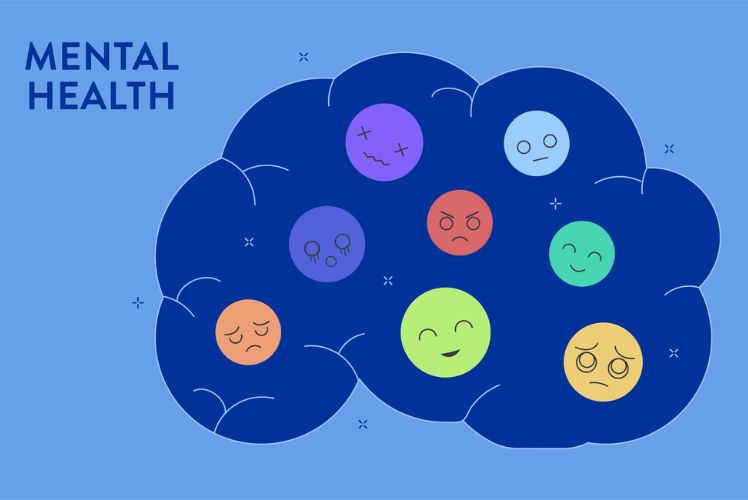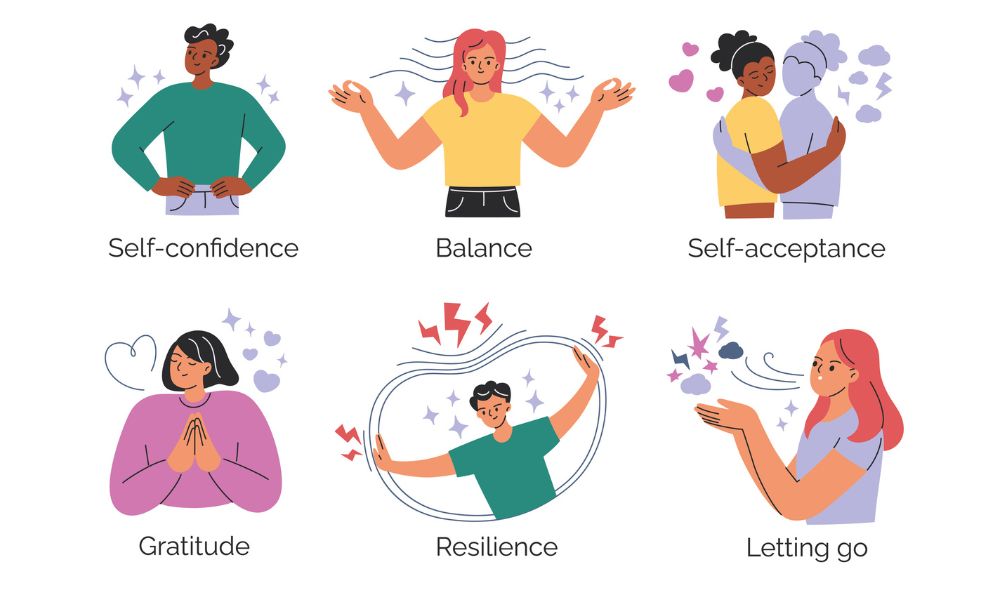Anger is a natural emotion, but when it goes unresolved, it can create significant challenges for our mental health and overall wellbeing. Unresolved anger can lead to stress and anxiety, affecting both our physical and emotional health. It’s crucial for us to recognise the signs of this hidden anger and understand how it can shape our daily lives.
Many of us may find ourselves experiencing anger that we do not fully address. This can lead to negative behaviours, strained relationships, and even chronic health issues. By exploring how anger interacts with our mental health, we can learn effective strategies to manage it and promote a healthier lifestyle.
Together, we can uncover methods to identify unresolved emotions and implement practical changes to improve our wellbeing. Understanding this powerful emotion allows us to take control and avoid its potentially destructive consequences.
Key Takeaways
- Unresolved anger can harm our mental and physical health.
- Recognising signs of anger helps us manage our emotions better.
- Effective coping strategies can improve our overall wellbeing.
Understanding Anger in the Context of Mental Health
Anger is a powerful emotion that can influence our mental health significantly. It is essential to comprehend its psychological aspects, the various types we may experience, and how they link to broader mental health conditions. This understanding enables us to manage anger more effectively and mitigate its impact on our wellbeing.
The Psychological Nature of Anger
Anger is a natural emotional response. It often acts as a signal that something is wrong. This response can stem from perceived threats or unmet expectations.
When we feel angry, our bodies go through changes. Our heart rate may increase, and we might experience heightened alertness. These reactions prepare us to confront challenges.
Yet, when anger is unresolved or persistent, it can muddy our emotional state. It may become a coping mechanism to mask deeper feelings like anxiety or sadness. Recognising these underlying issues is crucial for better mental health.
Types of Anger and Their Triggers
Anger comes in various forms, each with different triggers. Understanding these types helps in managing our responses effectively. Here are some common types of anger:
-
Passive Anger: This is expressed indirectly. We may not show our feelings openly, leading to resentment.
-
Overwhelming Anger: This type can lead to aggressive behaviours. It typically arises from stress or long-term frustrations.
-
Chronic Anger: This ongoing emotional state can negatively impact relationships and health.
Triggers can vary. Stress at work, personal conflicts, or past trauma can spark feelings of anger. By identifying these triggers, we can work towards healthier coping strategies.
Anger and Its Connection to Mental Health Conditions
Unmanaged anger is often linked to mental health issues like anxiety and depression. When we do not process our anger, it can manifest in harmful ways.
For instance, individuals with anxiety may use anger as a shield, masking their fear. On the other hand, those experiencing depression might feel persistently angry due to feelings of hopelessness. Both scenarios illustrate the complex connection between anger and mental health.
Addressing unresolved anger can lead to emotional healing. We might seek therapy or counselling to explore these feelings further. Understanding this connection will strengthen our journey towards improved mental health and emotional resilience.
The Impact of Unresolved Anger on Wellbeing
Unresolved anger can significantly affect our physical health, mental well-being, and social relationships. Chronic anger may lead to various negative outcomes that we must address to improve our lives.
Physical Consequences of Chronic Anger
Chronic anger can lead to serious physical health problems. When we experience unresolved anger, our bodies may remain in a constant state of stress. This can cause issues such as elevated blood pressure and increased heart rate.
Research indicates that ongoing hostility can increase risks for conditions like coronary heart disease and diabetes. Additionally, we may experience chronic pain and weak immune response, making us more susceptible to illnesses. Experiencing these physical symptoms can create a cycle of discomfort and anger, exacerbating our emotional struggles.
Long-Term Psychological Effects
The psychological impact of unresolved anger is equally significant. When we allow anger to remain unchecked, it can escalate into anxiety and depression. Our mental well-being can suffer, making it harder to cope with everyday life.
Furthermore, unresolved emotions can hinder our ability to process feelings, leading to persistent negative thoughts. This mental strain can create a feeling of hopelessness. If we do not address our anger, it may turn into long-term psychological conditions, impacting our happiness and overall health.
Social and Relational Outcomes
Unresolved anger often affects our relationships with others. When we are unable to manage anger, we may find ourselves lashing out at friends and family, which can create distance and strain.
In social settings, our unresolved feelings may lead to communication problems. We might become isolated, as others may find it challenging to engage with us. This disconnect can cause a ripple effect, further intensifying feelings of loneliness and distress.
Ultimately, addressing our unresolved anger is crucial for maintaining healthy relationships and social interactions.
Identifying and Understanding Unresolved Emotions
It is essential for us to recognise and understand unresolved emotions, especially anger. By increasing our self-awareness, we can identify the underlying feelings that cause distress. This awareness helps us address sadness and frustration, leading to better emotional health.
The Role of Self-Awareness
Self-awareness plays a critical role in recognising unresolved emotions. When we take time to reflect, we can observe our feelings without judgement. This reflection allows us to pinpoint when we feel anger arising from deeper issues like sadness or frustration.
We can keep a journal to track our emotions daily. Noting down moments of tension can reveal patterns we might overlook. This practice helps us identify triggers and understand why we react in certain ways. By improving our self-awareness, we empower ourselves to confront these feelings effectively.
Recognising Patterns of Unresolved Anger
Understanding unresolved anger requires us to recognise patterns in our behaviour. Often, this anger stems from past experiences that remain unaddressed. We might feel frustrated, but the root cause could be tied to earlier unresolved emotions.
Identifying these patterns can help us connect our current feelings with past events. For instance, we might find that a specific situation repeatedly triggers anger. Acknowledging this connection helps us shift our focus to resolving the underlying issues.
We can also create a list of situations that provoke anger. This can highlight common themes, such as feeling disregarded or undervalued. With this insight, we can better understand our reactions and work towards healthier responses to our emotions.
The Science Behind Anger: Hormones and Brain Chemistry
Anger triggers specific hormonal responses and involves complex brain chemistry that can profoundly affect our mental health. In this section, we will explore how these hormonal changes and neurological processes occur during episodes of anger.
Hormonal Responses to Anger
When we feel anger, our body reacts by releasing hormones like adrenaline and cortisol. These hormones prepare us for a "fight or flight" response.
- Adrenaline increases heart rate and energy levels, enhancing our ability to respond quickly.
- Cortisol, known as the stress hormone, is released during prolonged anger, which can lead to long-term mental health issues.
With repeated or unresolved anger, these hormonal responses can contribute to anxiety, depression, and other mental health disorders. It is crucial to manage these feelings effectively to avoid chronic stress and its consequences.
Neurological Aspects of Anger and Aggression
The brain plays a significant role in how we experience and express anger. Key areas involved include the amygdala and the prefrontal cortex.
- The amygdala is responsible for the emotional response to threats. It triggers our anger response and can lead to aggressive behaviour.
- The prefrontal cortex helps us regulate our reactions and make thoughtful decisions.
When the amygdala is overactive, it can lead to uncontrolled anger and aggression. A lack of control can impact our relationships and well-being. By understanding these neurological processes, we can work with mental health professionals to develop strategies for managing anger effectively.
Effective Coping Strategies and Therapeutic Approaches
To manage unresolved anger effectively, we can explore various coping strategies and therapeutic approaches. These methods provide us with the tools to handle our emotions constructively and improve our overall mental health.
Mindfulness and Meditation Techniques
Mindfulness and meditation can be powerful tools for managing anger. By practising these techniques, we learn to focus on the present moment without judgment. This can help us become aware of our feelings before they escalate.
Simple practices like deep breathing or guided meditation can reduce stress and promote calmness. We can spend just a few minutes each day on these exercises. This regular practice helps us cultivate better emotional responses, leading to improved mental wellbeing. Apps and online resources are available to support us in these mindfulness practices.
Assertive Communication and Conflict Resolution
Assertive communication is essential in expressing our feelings healthily. It allows us to voice our emotions without becoming aggressive or passive. We can use “I” statements, such as “I feel frustrated when...” This helps others understand our perspective and reduces the chances of conflict.
In addition, developing conflict resolution skills can be beneficial. Techniques like active listening and finding common ground can foster understanding. By practising assertiveness, we not only express our anger constructively but also strengthen our relationships with others.
Professional Interventions by Mental Health Experts
When anger feels overwhelming, seeking help from mental health professionals is crucial. Psychiatrists and therapists can provide tailored interventions to help us manage our emotions effectively. They may suggest cognitive-behavioural therapy (CBT) or other approaches that suit our specific needs.
Through therapy, we can explore the roots of our anger and develop coping strategies. These professionals also teach us skills to manage anger in various situations. Knowing when to seek help is a vital part of our mental health journey.
By using these coping strategies and therapeutic interventions, we can better manage unresolved anger, leading to improved mental health and overall wellbeing.
Lifestyle Adjustments for Managing Anger
Making lifestyle adjustments can significantly help us manage anger and improve our mental well-being. By focusing on our daily choices and habits, we can create a healthier environment that supports emotional balance.
The Relationship Between Lifestyle and Emotional Health
Our lifestyle choices directly affect our emotional health. Poor nutrition, lack of exercise, and insufficient sleep can heighten feelings of anger and irritability.
Additionally, habits such as excessive alcohol consumption or drug use may exacerbate anger issues. By recognising these connections, we can be more mindful about the choices we make.
To counteract these effects, we can implement positive changes. Simple actions, like taking a daily walk or practising relaxation techniques, can make a big difference.
Adopting a Healthy Lifestyle to Mitigate Anger
Adopting a healthy lifestyle is essential for managing anger effectively. A balanced diet rich in fruits, vegetables, whole grains, and lean proteins fuels our bodies and minds.
Regular physical activity, such as jogging, yoga, or team sports, releases endorphins that can improve our mood and reduce feelings of anger.
Additionally, setting aside time for relaxation techniques, such as deep breathing or meditation, can help us stay calm during stressful situations.
Finally, we must prioritise quality sleep. Good sleep habits improve our ability to cope with anger and stress. By making these lifestyle changes, we can cultivate a healthier emotional state.
Preventing Negative Outcomes: Self-Harm and Risky Behaviours
Unresolved anger can lead to troubling behaviours that harm our wellbeing. By understanding the connection between anger and self-destructive actions, we can adopt effective strategies to prevent these outcomes.
The Link Between Anger and Self-Destructive Actions
Anger can sometimes drive us towards self-harm or risky behaviours. When we feel intense emotions, we might cope in harmful ways, such as cutting, substance abuse, or reckless driving. These actions often provide a temporary release but can lead to serious physical or emotional damage.
Research shows that unresolved anger often correlates with higher risks of self-harm. Feeling overwhelmed can make us turn to dangerous behaviours as a way to express what we cannot articulate. This cycle can lead to significant mental health issues if not addressed promptly.
Strategies to Prevent Harmful Behaviours
To counteract the urge to engage in self-harm, we can implement some helpful coping strategies. Firstly, practising mindfulness allows us to recognise our emotions without becoming overwhelmed. Activities like meditation and deep breathing can create a sense of calm.
Secondly, we can express our feelings through journaling or talking to someone we trust. Writing about our anger may help us process those feelings, making them less daunting. Engaging in physical activities, such as exercise, provides a physical outlet for frustration.
Building a support network is also critical. Friends and family can offer comfort and guidance, helping us to navigate our emotions more effectively. Seeking professional help is another valuable option, as therapists can provide tailored coping strategies that work for us.
Frequently Asked Questions
Many people experience anger, but unresolved anger can lead to various issues. We often wonder about the effects of excessive anger on our mental and physical health, how it affects our relationships, and ways to manage these feelings effectively.
What consequences arise from excessive anger?
Excessive anger can lead to serious health problems. We may experience increased anxiety, high blood pressure, and headaches as a result of uncontrolled anger. It can also contribute to long-term issues such as heart disease if not managed properly.
In what ways does anger influence your brain and body?
Anger triggers a response in our brain that releases stress hormones. This can raise our heart rate and blood pressure. In the long run, remaining in a constant state of anger can impact our mental health, leading to conditions like anxiety and depression.
How does anger impact personal relationships?
Anger can create distance in our personal relationships. We may become more argumentative or withdrawn, which can lead to misunderstanding and conflict. Unresolved anger may also cause us to lash out, harming our connections with others.
What distinguishes repressed anger from suppressed anger?
Repressed anger is buried deep in our subconscious and can influence our behaviour without us realising it. Suppressed anger, on the other hand, is an active choice to hold back our feelings. We might decide not to express our anger but still feel it inside.
What strategies can be employed to address anger issues?
We can use various strategies to manage anger, such as exercise, deep breathing, and talking to a friend. Practising mindfulness and identifying triggers can also help us develop healthier ways to express our feelings. Seeking professional help is another effective option.
What are the potential outcomes of unresolved anger?
Unresolved anger can lead to mental health issues like anxiety or depression. It can also harm our physical health and lead to destructive behaviours. It’s essential to recognise unresolved anger to prevent these outcomes and foster our wellbeing.





















